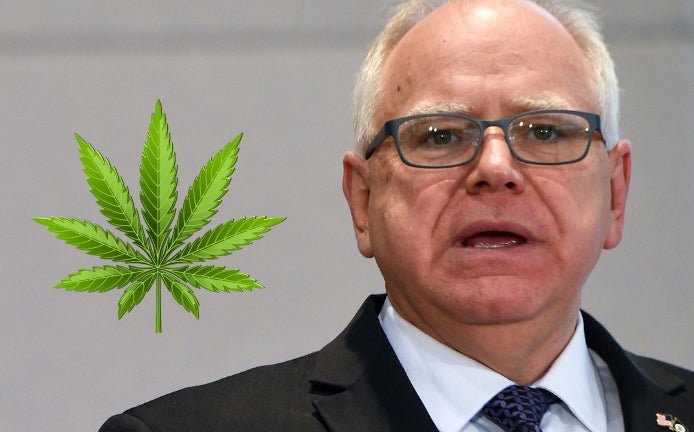With Democratic leaders applying pressure to keep the Badger State from becoming an "Island of Prohibition," top Republican legislators vow to pass meaningful legislation this year.

No one wants to be last to the party, particularly when it involves an issue that an overwhelming majority of voters approve of. Such is the case with cannabis legalization reform in the state of Wisconsin. With Minnesota becoming the 23rd state to legalize adult-use marijuana on August 1, Wisconsin is now surrounded by legal cannabis havens, leaving them to ponder a future as the lone "Island of Prohibition" in the region.
One GOP lawmaker has vowed to change that status, despite a track record of making similar promises in the past without delivering the laws to back them up. As first reported by Marijuana Moment, Wisconsin Assembly Speaker Robin Vos (R) announced that his caucus "is crafting a proposal that we hope to bring forward this fall." In an interview with the Wisconsin State Journal, Vos also provided a timeline for the proposed medical marijuana measure.
However, many Democratic lawmakers remain skeptical, in particular the pro-legalization Senate minority leader, Melissa Agard (D), who says she has not yet heard from any of her Republican colleagues regarding any tangible plans to move the issue forward.
What makes the situation so confounding is that most Wisconsin voters support some form of cannabis legalization. A poll conducted by the Marquette Law School in October 2022 found that 64% of registered voters, including 43% of Republicans, want fully legalized marijuana. Similarly, a 2019 poll showed that 83% of voters said that medicinal cannabis with a doctor's prescription should be legal as well.
With Minnesota's adult-use legalization measure going into effect last Tuesday, Wisconsin is now completely bordered by states with legal recreational cannabis sales. Unable but more than willing to purchase marijuana in their home state, Wisconsinites aren't waiting on empty promises from fickle politicians.
Instead, thousands are traveling to the neighboring cannabis enclaves of Illinois and Michigan to purchase marijuana products. And in 12 to 18 months, once Minnesota's retail dispensary licensing system is up and running, Wisconsin residents will be able to travel west to buy legal adult-use cannabis as well.
That revenue outflow is both substantial and concerning to Democratic leaders like Sen. Agard and Rep. Kristina Shelton (D), who took a tour of a Michigan cannabis business over the weekend and, in a Twitter post, said that she "grabbed incredible merch and yes, purchased some product."
Rep. Shelton went on to say in her post, "Here's the deal folks… the most dangerous thing about cannabis is that it's illegal in Wisconsin."
"Here's the deal folks… the most dangerous thing about cannabis is that it's illegal in Wisconsin."
- Wisconsin State Rep. Kristina Shelton (D)
Based on the financial returns, their concern is warranted. A new market analysis by one of the country's leading cannabis law firms predicts that Minnesota could have a legal marijuana industry generating over $1.5 billion per year in sales by 2029 and serving more than 700,000 customers annually. Likewise, a separate study by the Minnesota Department of Revenue estimates those cannabis sales could bring in about $110 million in tax revenue by 2027.
In Illinois, retail dispensaries made over $1.5 billion in marijuana sales in 2022, roughly 15% of that revenue generated by dispensaries in counties bordering Wisconsin. Of that amount, the Legislative Fiscal Bureau estimates that half of those sales came from out-of-state residents. That same study also calculated that of the $462 million Illinois received in tax revenue from cannabis sales in fiscal year 2022, $36 million came from citizens of Wisconsin.
Michigan, which legalized adult-use cannabis in 2018, saw over $2 billion worth of recreational marijuana purchased in 2022 by both in- and out-of-state residents, quadrupling the numbers generated in 2020. Tax revenue from those sales has helped fund educational and infrastructure initiatives across the state.
Adding more urgency and concern to the situation for cannabis reform advocates and pro-legalization lawmakers in Wisconsin, a new study conducted by the Wisconsin Policy Forum, a nonpartisan, independent research organization, found that 50% of Wisconsinites over 21 live within a 75-minute drive of a recreational dispensary. And once Minnesota dispensaries go online, that number will only increase, according to Ari Brown, a senior research associate at the forum.
"Knowing that Wisconsinites are getting in their cars, taking time out of their lives to drive to these states and spending their hard-earned dollars in these states and invigorating a tax base and the economy in other communities — I know Wisconsinites would prefer to spend their money here," said Sen. Agard (D).
"Knowing that Wisconsinites are getting in their cars, taking time out of their lives to drive to these states and spending their hard-earned dollars in these states and invigorating a tax base and the economy in other communities — I know Wisconsinites would prefer to spend their money here."
- Wisconsin State Senator Melissa Agard (D)
With only more promises and very little in the way of actual details, the expectation from both sides of the aisle is for a strictly limited measure that many Democrats believe will be too restrictive to garner their support.
One potential positive outcome from the cannabis debate is that it may finally force lawmakers to address the blatant gerrymandering of legislative districts in the state, which has given the predominantly anti-cannabis GOP a near super-majority in the legislature.
According to Sen. Agard, this disproportionate legislative majority does not allow voters' authentic voices to be heard. However, a recently filed lawsuit with the state Supreme Court challenging the constitutionality of the GOP-drawn legislative district maps could finally end the practice and help redraw the state's political maps.
In the meantime, Agard will have to work with her GOP counterparts to craft meaningful legislation to advance the issue. Until they do, residents will have to continue to regularly visit their more enlightened neighboring states to enjoy the opportunity to buy legal marijuana.







































